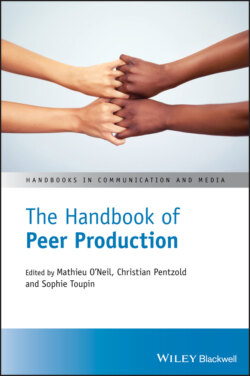Читать книгу The Handbook of Peer Production - Группа авторов - Страница 93
4 Meritocracy
ОглавлениеAlthough peer production projects are generally open to participation by anyone, there are certainly hierarchical tendencies within them and with this comes forms of closure and exclusion. On the one hand, there are formal hierarchies – project leaders, maintainers, committees, Wikipedia editors, and so on, and these various positions entail different rights and privileges. In Wikipedia’s case, for example, the user class “bots” has more rights than anonymous users, reminding us that such large‐scale peer production also requires socio‐technical forms of government (Niederer & van Dijck, 2010). Proponents of peer production argue that these hierarchies are flexible arrangements that serve a larger goal of ensuring equal participation, rather than serving to sustain themselves (Bauwens, 2005). On the other hand, there are informal hierarchies that can be understood as accumulations of symbolic capital – think for example of a Wikipedia admin who holds particular esteem and is deferred to by other editors and admins. In idealized form, these hierarchies in peer production arise from merit as opposed to credentials, meaning there is no prior separation of experts and non‐experts, qualified persons and unqualified persons. Instead, the aim is that individuals earn their position through demonstrations of their ability and commitment to the project. In practice, both Wikipedia and open source communities display strong beliefs in the importance of rewarding people based on individual merit, and in the possibility of a functioning meritocratic system. I emphasize that the belief also relates to the possibility of meritocracy because this is a contentious position to hold. Before moving to critiques of the belief in meritocracy in peer production and related online communities, however, this section first develops the concept of meritocracy in peer production further.
